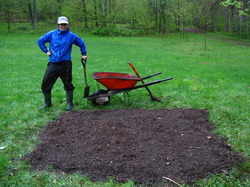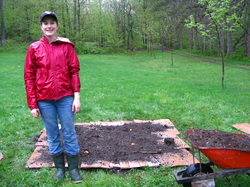|
Over the weekend, I finally built my own garden. I've wanted to have my own garden for years now, but this was the first summer that I was going to be in one place long enough to start it. Initially I was going to have my dad till a part of the land at his cottage for me. My parents and grandparents used to have a garden up at the cottage, but finally gave up on it since the soil is poor and the animals have way more time and patience to infiltrate the garden than my parents did keeping them out. Because maple syrup season has just finished, my dad didn't have time to till the garden plot for me. I figured that doing conventional gardening would be easiest for my first try. I debated doing it myself... but if you know me and heavy machinery, you would probably agree that this is a bad idea. With time running out, I decided that since I'm taking a permaculture class that has been pleasantly taking over my life, I should try to actually implement what I've learned. After all, that's why I wanted to take the class - to use some skills in real life. Permaculture generally discourages the use of tilling the land, so my first step was to figure out how to make a garden without using a tractor or rototiller. It turns out that there's a way to build soil quality and create a garden without digging it up. This is called sheet mulching, and there's a pretty cool video about how UMass created a large permaculture garden at their school by using this same technique. Basically, on top of the grass, you layer compost, cardboard, and mulch to create a rich layer of organic matter, which your plants will like. You have to be careful to have a good carbon to nitrogen ratio of 30:1, which is ideal for plants. For example, if you add lots of unfinished compost (vegetable scraps), you should put something more "brown" (like leaves or newspaper, things high in carbon) as the next layer. That's how you do it in theory. I decided last week that I was going to do sheet mulching. Where was I going to get so much cardboard, compost, and more compost/mulch in a week? I live in the city. Luckily, I had decided on this plan the day before recycling day. I "liberated" about thirty cardboard boxes from the recycling piles on the street. They had already been flattened and organized into larger boxes, so at least I didn't have thirty open boxes lying around my apartment. Now for the compost. I had read from the TOHU website that the St. Michel environmental complex was giving away free compost. Ka-ching! I went there before my permaculture class and loaded up my car trunk with compost. Well, initially I looked like an idiot because since I didn't have a spade or any real containers to put said compost, I was using my snow shovel to spoon it into plastic recycling bags. The man next to me was nice enough to lend me a real shovel. However, I could only collect about three full recycling bags full of it before I realized I was late for my class. I wasn't quite sure what to use for the top mulch layer, but my permaculture teacher Graham helped me out with the list of free mulch that I had access to at the cottage (leaves, grass clippings, old compost, etc). Then came the moment of truth: could I pull together my scraggly collection of vegetable scraps, stolen cardboard boxes, newspapers, free compost, and other various organic matter-y things to somehow make a garden? The cheap-o (or thrifty person, as I prefer) in me said YES! My parents looked skeptical as carted wheelbarrows full of boxes, compost, rotting vegetables, and seeds down to my claimed space. I initially thought that I would make a garden about 5 feet wide and 10 feet long. As soon as I put the first layer of vegetable scraps, I realized I needed to make it about half that size. So I made a garden 4 feet by 5 feet (even that's exaggerating a bit). But magically, I just barely had enough materials to make a raised garden. This is me standing in front of the smallest garden in the world: Oh yes, and I forgot to mention that it was RAINING the entire day that I did this. Well it wasn't just me- Lacey, the most devoted girlfriend in the world, also helped me out. Eventually, we put the top layer of compost on. I had luckily found the jackpot of compost at the cottage, which happened to be where my family has been dumping food scraps outside for approximately 10 years. Normally you're supposed to do the sheet mulching process in late summer of the year before you want the garden, but I did this in a week. I figured I should just put finished/old compost on top, otherwise the seeds would be trying germinate in leaves or whatever else I could rustle up.  <This Lacey in front of the finished sheet mulch. We planted rows of carrots (I like carrots), peas (because peas like carrots and they're legumes so they give nitrogen to the soil), basil (supposedly basil will confuse mammals and dilute the good smells of the other growing leaves), and pumpkins/zucchinis/cucumbers (their prickly leaves will hopefully keep out the mammals). I also planted sunflowers because it goes with the three sisters, which I will explain another time, and I didn't have enough room for in my garden, but I figured probably fewer animals want to eat sunflowers. Hopefully at least one plant will grow. Before it gets eaten by the groundhog.
0 Comments
If you have never seen a TED talk, you're missing out. TED.com showcases trendy, intellectual presentations presented in an interested way. I just watched this one called Changing Education Paradigms, which questions the rise of ADHD combined with technology that updates literally every second (Facebook, Twitter, hundreds of TV channels). Why are children grouped at school predominantly by age? Kids learn in so many different ways (in groups vs individually, visual vs auditory learners) that it seems odd to classify them just by what year they were born.
I was lucky in that my personality fit relatively well into how traditional school is organized. However, I know a lot of people who are brilliant, but either don't apply themselves to what they're learning because they feel it's not relevant, or just don't learn in the way that public education is set up. The talk by Ken Robinson brings up a good point that instead of letting students work on what is really important to them, all the students in the class are brought to be "average". This gives me a few things to think about when I teach my own science class. I generally incorporate discussions, activities, and observational labs in my class. 30% of the course is based on their activism project, where the students must design and implement a community/environmental service project of their choosing. But still, another 30% is based on exams, which I know is a more traditional way of testing knowledge. I try to only test students on the most relevant course material - they don't have to memorize the nitrogen cycle, but they should know what causes climate change. This sort of goes back to the overarching theme of my life - learning how to actually do things. Tomorrow I'm going to attempt to plant my garden. It's supposed to rain all weekend, but I have the design of how I'm going to set it up, and I am very determined to do it. I have lots of compost/cardboard/grass clippings/food scraps to try my no-till setup. Conventionally, people till the soil before planting the seeds. Since I'm taking a permaculture class, one idea is to lay grass clippings/vegetable scraps, cardboard, then compost, then seedling soil on the ground before planting your seeds on top of this. Not only is this my first garden that I'll plant by myself, but it's also the first time anyone in my family is trying this no-till idea. However, since permaculture is based off the way things grow in nature, I feel fairly confident that by replicating nature, I should be somewhat (?) successful. I'll let you know how things go on Monday. In the permaculture class I'm taking, a reoccuring idea is to produce more positive than negative effects. For example, farming in a conventional way tends to use lots of pesticides, tilling which increases soil erosion, and fossil fuels. Using permaculture principles, you could build a pond near your garden (so you could recharge the aquifer and wouldn't have to water it as much), plant crops that complement each other and have beneficial effects, and use compost from kitchen scraps instead of buying fertilizer. I think this is a great permaculture example. Now how do I apply this idea to my whole life?
Since I was a little kid, I realized that as long as I was a human in western culture, I would probably be using way more resources than I would be putting back. Sure, I try to reduce my ecological footprint as much as possible, but let's face it: I live in a typical apartment, I work at a regular job, I don't eat as much local/organic food from a farmers market as I would like, and whether I like it or not, I am a part of mainstream culture. Sometimes I drive my car. Sometimes I eat meat. Sometimes I go on airplanes to faraway locations. I can justify this to myself all I want: sometimes taking a bus to a rural location is not practical, sometimes eating meat is good for my diet, and sometimes I just like to go on vacations to exotic places. Sometimes I want to go all out: become a vegan, transform my car into some kind of combination biodiesel/mobile organic farm, stop using electricity, only take transportation that requries me to self-propel. A student in my class this semester asked me: Shona, since you believe so strongly in climate change, how can you keep living a normal life? Why don't you go off the grid and become totally self sufficient? I responded by saying that I'm an environmental science educator, so living in the woods by myself somewhere is not condusive to helping other people understand why our society needs to transform into something more sustainable. I think that's only part of the answer, and I'm still working the rest out. My hope is that my actions and projects can contribute to my postive impacts. I may not be able to reduce my ecological footprint entirely now, but I can try to teach others and hopefully spark a chain of events that will somehow offset my impact. Maybe this is just me trying to justify my presence on earth, but it is my hope. Next weekend, I'm going to plant my garden. I bought the seeds, I know where I want the plot at my cottage, and I have a list of what plants should be grown together (this is called companion planting). However, I have no idea what to do. Sure, I know what I should theoretically do- I've taken plant biology classes and even an entire university course about ecological gardening. I've read books, heard my friends talk about it, and I've asked my grandfather for advice every time I see him. But I've never actually planted a garden myself. How big should I make it? When is a good time to plant? How much compost should I put on it? How often do I need to weed or water?
I think it's really important to know how to be as independent as possible. Ideally, I will eventually know how to do everything that I depend on in life myself. To me, this means knowing how to grow all my own food without a huge amount of oil, preserving vegetables so they last all year, being able to find medicinal plants, and living off of renewable energy. But don't get me wrong- I am a city kid. Well, a suburb kid. I was raised on Kraft Dinner and canned soup, surrounded by hundreds of houses that looked exactly like mine. My family is the typical mom and dad, two kids, white picket fence type. The only thing that was missing was a dog. I was lucky though- my family went on mandatory bike rides and hikes through national parks, and we visited the cottage every other weekend. So while I was almost totally surrounded by mainstream American culture, I always had an interest to live a more alternative lifestyle. I eat food every day, and most of it comes from California. I would like to change that. My first step is to grow a garden this summer. This feeling of knowing how to do things theoretically, but having zero confidence in the ability to do things in real life has led me to take a permaculture class. It has taken me a little while to figure out how to define permaculture, but it's basically designing human and agricultural systems to mimic patterns found in nature. Instead of planting a monoculture of just a corn field, a permaculture system would collect rainwater, increase soil fertility, integrate wild species to reduce pests, and grow several different crops so that it wasn't totally dependent on just one species. That's one example of a permaculture way of thinking. I'm taking a 72 hour Permaculture Design Certification class to learn more. It's really interesting, and I have enough notes scribbled in my notebook to keep this blog filled for months. There are a few workshops offered at Co-Op La Maison Verte, if you would like to learn more about worm composting (May 10th), sprouting and fermentation (May 12), or nutrition (May 17th). Today, I went out for lunch. Exciting, right? Well, it was exciting because I finally had an excuse to try out Aux Vivres, on St. Laurent. I've wanted to go there for a while, since I heard it was a great place for vegan food. I'm not a vegan (not even a vegetarian), but I don't mind going without animal products. I met my friend Clare there, a good friend from my Mac Campus days. We started off with an appetizer of chapati (Indian bread, similar to na'an) with "butter". I have no idea what the "butter" was made of, but it was really delicious. For lunch, I had the Aux Vivres veggie burger, potato wedges with chipolte ketchup, and coleslaw. Everything tasted so good that I forgot it was all vegan. Clare had a huge veggie "lox" sandwich, and surprisingly it did taste like salmon, even though it was made from carrots (I think) and various other ingredients that combined together to magically taste like a fish. I generally try to stay away from vegetarian food that pretends to be something made from an animal. Actually I try to stay away from most things that try to pretend to be something else, like potato chips that taste like chicken or ribs. However, sometimes these flavors are so convincing and so delicious that I can't avoid them. Most of my good friends know about my uncontrollable love for Ruffles barbeque or all-dressed chips, which are definitely trying to pretend to be something else. Anyway, I have to stop talking about food or else I'll want dessert.
Jane's Walk Jane's Walk is happening May 7th and 8th in neighborhoods across Montreal. These are guided walking tours that encourage local knowledge, culture, history, and nature. You can check out the pdf to find guided tours near you. The walk is named after Jane Jacobs, author of The Death and Life of Great American Cities (1961), which encouraged city planning to find alternatives to a car-based community. Hello! I'm starting a blog to keep on my website. I was inspired to start a website after students in the science class that I teach at Champlain College of Vermont created one for their art portfolios. While I'm not so much as an artist as a person who loves her beat-up Canon, I wanted a place to show new people and potential employers what I'm up to.
In this blog, I hope to post events and conferences around Montreal related to permaculture, sustainability, beekeeping, and wildlife. I would like to start off by one created by McGill Apicultural Association, which I am a new member of: Wild and Native Pollinators Workshop: Joins us on Saturday, May 7th at 2 pm, in MS 0-027 (Mac Stewart lobby) to learn about creating habitat for wild pollinators that perform this vital ecosystem function. Ms Michelle Poilly will give a presentation on the insect allies in the area and then we'll assemble the prepared nests and drill some holes into some logs. http://www.maa-mac.com/ |
About ShonaI'm an eco-conscious girl from Montreal, Quebec. I'm currently an adjunct science professor at Champlain College of Vermont (Montreal Campus). I'm interested in any opportunities to expand my experience with grassroots activism, climate change legislation, or environmental education. Archives
March 2016
Categories
All
|


 RSS Feed
RSS Feed
